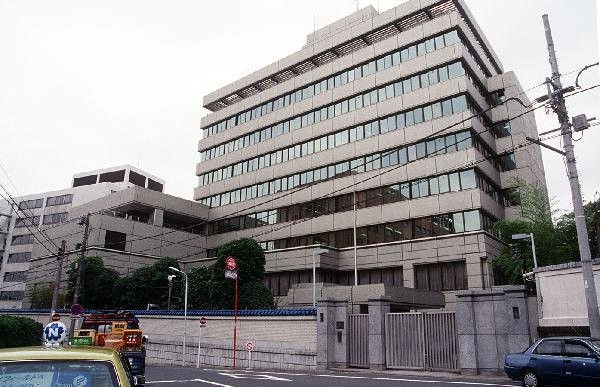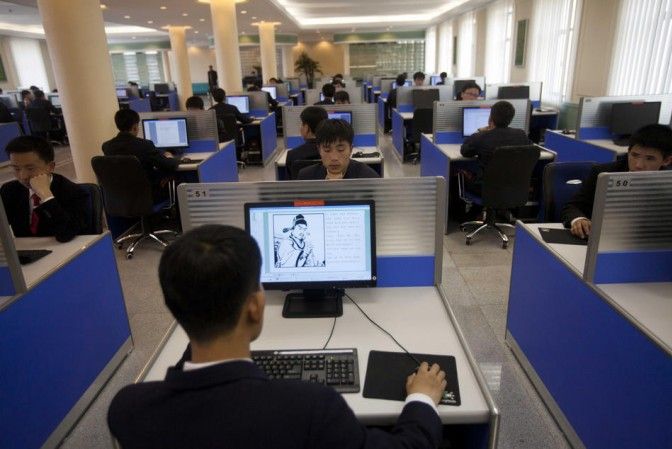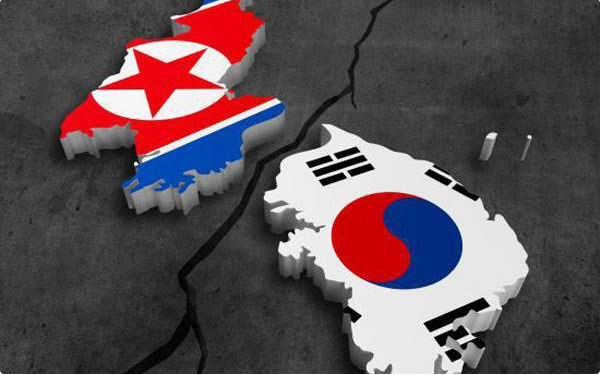A North Korea you don't know: beauty temptation, hacking money, national mining
Under the double blow of internal poverty and external high-pressure sanctions, North Korea regards Bitcoin as a tunnel exit to spring. Similar to Iran, Venezuela and other countries, in the face of US sanctions, the hopeless North Korea has bet on the emerging technology of the blockchain. Bitcoin is not only an important source of funds for North Korea to nourish nuclear weapons, but also as a kind of The means of American political game.
US sanctions force North Korea to tighten nuclear weapons
The United States is one of the countries that can't look good to others. It always fights everywhere with the guise of justice and harms the safety of people in other countries. The sanctions from the United States are not only directed against Iran, Venezuela, Israel and other Middle Eastern countries. Over the years, the United States has never weakened sanctions against Asian countries. North Korea is a clear case.
Where there is oppression, there is resistance.
- Compared to the original development contest | PayPaw.org: Let everyone see the advantages of blockchain payment
- Interpretation of the central bank's digital currency: To replace the banknote coin, it is very different from Bitcoin
- Under the US SEC, the VERI price immediately followed.
Over the years, the United States has maintained a constant high pressure on North Korea, especially after Trump took office, and even increased the sanctions against North Korea. According to statistics, from 2016 to 2017, the UN Security Council passed a total of six sanctions against the DPRK. Except that Resolution No. 2356 of 2017 only involved personal sanctions against the top government of the DPRK, the remaining five resolutions were all related to North Korea’s economic and social Closely related, after the sanctions came into effect, North Korea’s people’s livelihood economy was seriously affected.
High pressure and crisis have made North Korea choose to develop nuclear weapons to protect its own people. Nuclear weapons have also become a lifeline for North Korea to survive independently in this fast-growing world under extreme poverty.
Behind the North Korean nuclear issue, there has been a problem that has plagued US intelligence agencies—the source of funding. In the face of rounds of US sanctions, North Korea has not only failed to ruin, but has carried out nuclear project development to the end. However, the development of nuclear weapons requires huge amounts of money and high-quality technical support. What is puzzling is, in poor North Korea, where does the money for developing nuclear weapons come from?
Where does North Korea’s money for developing nuclear weapons come from?
We set the time back to 2011.
In the Wanjingtai Youth Palace in Pyongyang, a group of teenagers recited their blessings to the leaders in Korean. Unlike ordinary Korean students, they wore uniform uniforms and were even taller, with no malnutrition on their faces. The pimples, and almost all wearing Nike Adi's sneakers, are also wearing the latest style of sports watches, everyone can speak fluent English.
This trip is a "pilgrimage to the motherland" funded by the General League.
In the face of US sanctions, North Korea’s legal way of obtaining foreign exchange has only been to export workers, open restaurants, and travel and tourism, but this has only allowed North Korea to obtain very little foreign exchange earnings.
North Korea’s most important source of foreign exchange is mainly donations from overseas Korean groups of overseas Chinese. The most famous of these is the “General Assembly of the DPRK”, which is the Korean Federation of Generals established in Japan.
(Towards the headquarters of the General Assembly, auctioned by the Tokyo District Court in February 2013)
According to the US "Global Security" website data, the revenue of the General League is mainly dependent on the gray industry.

The United States is the largest gray industrial chain system in Japan, with one-third of Japan’s “Golden Palace” industry, which is a casino. It can transfer 600 million to 1.9 billion US dollars of foreign exchange to North Korea from the industry only. These foreign exchanges constitute one of the most important sources of income for North Korea, which is sanctioned by US high pressure.
However, with North Korea’s increasingly heavy economic restructuring and the Japanese government’s gray production governance, the DPRK’s general elections have become increasingly sluggish and finally declared bankruptcy in 2012.
The bankruptcy of the General League is equivalent to the source of the North Korean Treasury’s expenditure. However, nuclear weapons are the country’s unchanging national direction and are always to be developed. Where money comes from, you can think about it from a long time.
Park Sung-hwan, a 23-year-old graduate student at the University of Tokyo, was also a member of the Youth League tour of Pyongyang in 2011. Recently, in Park Sung-hwan’s latest Twitter update, he has sunk his own digital currency wallet and said that he is studying blockchain technology. This high-school student who has been able to continue his studies under the support of the DPRK is facing the United States in the motherland. At the time of the high-pressure sanctions, the new trend of the source of funds from the North Korean Treasury was inadvertently revealed – the blockchain and Bitcoin.
Opening up a new channel for capital mining
On May 17, 2017, many blockchain data organizations discovered a strange phenomenon: the frequency of bitcoin node activity from North Korea suddenly increased exponentially during the year , and the data reached zero from zero every day. .
Since 2017, people have been surprised to find that North Korea, a country that is extremely poor and backward in the international impression, has frequently been exposed to the high-tech term of Bitcoin. Western media even speculated that North Korea is lifting the power of the country to pick up bitcoin.
However, this is very inconsistent with North Korea’s strict control over the Internet.
As everyone knows, North Korea has strict control over the Internet. The number of computers in the whole country is limited. The IP space is even more tense. Most ordinary people have no computers at home, even those with special computers or families. After connecting the network, the computer can only go to some news and government agencies' websites, and can only express some blessings to the leaders, but digging bitcoin is impossible for ordinary families and individuals.
Therefore, the number of bitcoin node activities that suddenly increased in North Korea could not be spontaneously formed by civil power. In North Korea, which is highly centralized, there is only one possibility: that is, the North Korean government or the military is planning. The development of bitcoin mining activities.
According to Priscilla Moriuchi, former head of cybersecurity for the Asia-Pacific region of the US National Security Agency, in 2017, North Korea received at least 11,000 bitcoins through mining and hacking, and the profit was over $200 million. According to the price, the price won by North Korea in 2017 should be around $120 million.
Some media have reported that in the university classrooms in Pyongyang , North Korean university students are receiving secret training from hackers and mining forces from state organizations. North Korea has set up special courses to teach them digital money, and they have spent a lot of time inviting them. Overseas experts and scholars went to the DPRK to teach. In November 2017, North Korea officially invited an Italian professor to Pyongyang University of Science and Technology to elaborate on the basic principles of blockchain technology and the internal network of Bitcoin, risks and related measures to ensure safety.
(In a computer lab at the Kim Il Sung University in Pyongyang, students work in front of computers)

These hackers and mining reserve teams have not only undertaken the great cause of "mining for the leader", they have a more well-known name – Lazarus.
Secret stealing bitcoin
The first time North Korean hackers received international attention was when the 2014 Sony hacking incident occurred.
On June 11, 2014, Sony Pictures Entertainment Co., Ltd. launched the first trailer for the film "Interview" (also known as "Assassination of Kim Jong-un") on the Youtube website. Once the trailer was released in just a few minutes, it became a global One of the most popular videos is widely spread around the world. This action comedy tells the story of two American talk show hosts who went to Pyongyang to assassinate Kim Jong-un under the direction of the US Central Intelligence Agency.
After the film was released, North Korea continued to criticize it and issued a public threat message to the United States saying it would retaliate. At the end of November of that year, Sony Pictures was hacked at its headquarters in North America. According to CNN, the investigators have concluded that hackers from North Korea attacked Sony's intranet, and the attackers claimed to be "peace defenders," but North Korean officials announced that they had nothing to do with the attack.
After Sony’s hacking incident, the cyber warfare set by North Korean hackers began to shift from a purely political goal to an economic goal.
In 2017, the US FBI issued a survey report that the North Korean government has been ordering hacker organizations to launch attacks on the Internet for the past eight years. The targets of the attacks include the destruction of military institutions, government websites, and financial institutions around the world. Among them, the most famous case is the $100 million theft in the Federal Reserve of Bangladesh in March 2016.
As the mysterious hacker organizations organized by the South Korean government frequently attacked theft of assets on the Internet, people began to understand the mysterious hacker army of North Korea. It is reported that North Korea’s hacking force has reached 7,000 in 2017. These people can use the Internet at will, enter and leave North Korea at will, and enjoy free Pyongyang’s high-end apartments. It is a group that North Koreans dream of joining.
It is widely believed that the North Korean hacker group is code-named "Lazarus."
"Lazarus" originated from the name of a poor man in the Bible who was resurrected by Jesus. Before the resurrection of Lazarus, Jesus said a famous saying to him: "Whatever you ask God, God will give it to you." This sentence is also the motto of the North Korean secret hacker organization Lazarus. Even if they are rejected by their peers around the world, North Korean hackers still use this as their motto.
There is evidence that with the rapid rise of blockchain and bitcoin, Lazarus began to shift its focus to Bitcoin in 2016.
At the same time, bitcoin and blockchain have also been highly sought after in South Korea, and South Korea has become the world's third largest bitcoin market after the United States and Japan. A large amount of bitcoin reserves, the same language and culture, there is no reason for South Korea to prevent North Korean hackers from being bloody. There is no doubt that South Korea is the most seriously injured by North Korean hackers.

In December 2017, the BBC quoted the South Korean intelligence agency NIS as saying that Bitumumb, the Korean bitcoin exchange, was attacked. Bitcoin worth 7.6 billion won was stolen, and personal information of 36,000 accounts was leaked at the same time. Afterwards, the hackers also extorted 6 billion won from them in exchange for the removal of these leaked personal information, involving a total amount of 83 million yuan.
In June 2019, South Africa's largest cryptocurrency exchange, Upbit, also suffered from phishing incidents. North Korean hackers camouflaged beauty on Facebook, approached exchange employees through online chat, and finally sent files containing malicious code to carry out attacks.
Wen Zhongyu, president of EST Security, a Korean network security company, said that in recent years, North Korea has started tactics for the beauty of important economic sectors in South Korea.
In addition to posing as a scam to lure insiders of the Korean crypto exchange, North Korean hackers have also tried fake job seekers to send resume emails to exchange executives, all of which contain malware that steals personal information and transaction data.
On August 7, Reuters reported that in a recent UN report, North Korea’s cumulative profit by attacking cryptocurrency exchanges has exceeded $2 billion. The report is based on the continued tracking of North Korea over the past six years. The independent expert submitted to the North Korean sanctions committee of the UN Security Council. With this report, the outside world also first learned about the status quo of the North Korean blockchain hidden under the hacker attack and the beauty spy.
In order to prevent these large bitcoins obtained through illegal means from being traced, North Korea usually splits large bitcoins, transfers them from a large number of personal accounts, and silently transfers stolen goods.
North Korea not only uses digital currency in exchange for foreign exchange, but also illegally obtains illegal funds from other sources into the currency market and whitewashes money. North Korea has become a national-level bitcoin player with a sound system, clear division of labor, and tight organization.
In 2019, the price of bitcoin leaped into the bear market in 2018, and it started to rise. It is conceivable that North Korea will never give up its desire for bitcoin in 2019, and it will even worsen.
We will continue to update Blocking; if you have any questions or suggestions, please contact us!
Was this article helpful?
93 out of 132 found this helpful
Related articles
- BTC US Dollar Trading Market July Monthly Report
- Is cryptocurrency regulation unpleasant? But you have no reason to reject the 7 benefits that it will bring.
- Samsung smartphones quietly support Bitcoin, but only these 7 countries can use
- Blockchain game: Where are the opportunities?
- QKL123 market analysis | Bitcoin and gold fell together, "up also Xiao He, fall also Xiao He" (0814)
- Proof of Life: Why is Bitcoin a living being?
- Observation | What hinders the large-scale application of blockchain?





